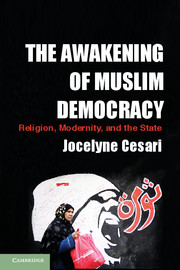Book contents
- Frontmatter
- Contents
- Acknowledgments
- Preface
- Part I THE MAKING OF ISLAM AS A MODERN RELIGION
- Part II ISLAMISM AS THE PREEMINENT POLITICAL FORCE PRE– AND POST–ARAB SPRING
- Part III THE DISJUNCTION OF DEMOCRACY AND SECULARISM – LESSONS LEARNED FROM THE ARAB SPRING
- Appendix I Religious Violence Index
- Appendix II Egyptian Constitution, Ratified on December 26, 2012. Suspended on July 3, 2013
- Bibliography
- Index
Part II - ISLAMISM AS THE PREEMINENT POLITICAL FORCE PRE– AND POST–ARAB SPRING
Published online by Cambridge University Press: 05 July 2014
- Frontmatter
- Contents
- Acknowledgments
- Preface
- Part I THE MAKING OF ISLAM AS A MODERN RELIGION
- Part II ISLAMISM AS THE PREEMINENT POLITICAL FORCE PRE– AND POST–ARAB SPRING
- Part III THE DISJUNCTION OF DEMOCRACY AND SECULARISM – LESSONS LEARNED FROM THE ARAB SPRING
- Appendix I Religious Violence Index
- Appendix II Egyptian Constitution, Ratified on December 26, 2012. Suspended on July 3, 2013
- Bibliography
- Index
Summary
OVERVIEW
The electoral success of Ennahda in Tunisia, the Freedom and Justice Party (FJP) in Egypt, the Justice and Development Party (PJD) in Morocco, and the Justice and Development Party (AKP) in Turkey highlights the centrality of Islamism in political transitions from authoritarianism.
However, this is not to say that secular political forces are nonexistent. In fact, they have played a significant role in the Arab Spring revolutions, and they have been decisive in the postauthoritarianism phase as shown by the fall of President Morsi in July 2013.
Most interestingly, as we shall discuss in Chapter 9, secular influences do not come primarily from professional political parties but from civil society itself: youth groups, women’s organizations, artists, and entrepreneurs: in other words, all the forces that were decisive in the uprisings against the authoritarian regimes. It is, however, important to keep in mind that “secular” in this context does not mean privatization or rejection of the social influence of Islam; instead, it refers to a dismissal of what Bassam Tibi calls Shariʿatization of politics, meaning the implementation of a fixed medieval code of penal and civil laws as some Salafi groups advocate.
In other words, Islamism is only one facet of political Islam, broadly defined as a national political culture. For this reason, it will remain relevant to future political developments.
More specifically, Islamism can be interpreted as an amplification of the framing and pruning of Islam by the authoritarian state described in Part I. Amplification occurs when new ideas and practices emerge through a never-ending dialectic between grafting of new ideas and influence of the local context. While the state has appropriated Islam through means of institutionalization and nationalization, Islamist opposition groups have, in turn, used Islam’s staying power in society as a source of opposition to the state. Even if their popularity has declined in the postauthoritarian phase in Egypt and to a certain extent in Tunisia, they will remain a significant political force.
- Type
- Chapter
- Information
- The Awakening of Muslim DemocracyReligion, Modernity, and the State, pp. 121 - 122Publisher: Cambridge University PressPrint publication year: 2014



